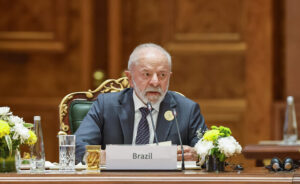
Published 27/03/2025 17:45
Argentine President Javier Milei announced on Thursday (27) a $ 20 billion agreement with the International Monetary Fund (IMF), but the institution denies the value and the proposed terms. In a speech at the insurance regulatory conference, Milei stated that resources “will not increase debt” as they will be used to recapitalize the Central Bank and strengthen the ballast of the local currency. However, critics point out that the loan, combined with World Bank and IDB packages, will raise gross reserves to $ 50 billion – money that, according to analysts, will support financial speculation, not productive growth.
“It is a debt that not indebted,” said Milei, contradicting his own historical opposition to agreements with the IMF. For economists, the narrative is misleading: “External internal debt does not reduce liabilities, only turns risk to the future,” criticizes an analyst from Argentine Economic Center. As a deputy, Milei classified Macri’s loan as “immoral”, but now argues that the current adjustment “will cost future generations.”
Milei argues that the resources would be used to reinforce the Central Bank reserves, allowing them to reach $ 50 billion with the support of other financial entities, such as the World Bank, the Inter -American Development Bank (IDB) and the Andean Development Corporation (CAF). “Increased debt is immoral,” said the president, despite being closing an agreement that will significantly raise Argentine liabilities.
Impacts on the population
Experts warn that if the agreement is completed, Argentina may face a prolonged period of austerity. The government has already implemented drastic cuts on social programs and subsidies, and new adjustments may be necessary to meet the IMF requirements.
Thus, the gigantic sacrifices made by Argentine society to support Milei’s “chainsaw” seem to have served for nothing, when he contracts new loans to further impose austerity on the worker. The social explosion has already been detonated with demonstrations of retirees under brutal repression, with promises to climb further.
Milei’s promises to eliminate foreign exchange controls from January 2026 also generate concern. Many economists predict that the abrupt release of the currency market can cause inflationary shock and accentuate the country’s economic crisis.
Economists warn that the agreement can deepen inequality. “Resources will not finance health or education, but the ‘financial bike’,” supporting banks and speculative funds. “It is socializing losses and privatizing gains,” summarized economist Mercedes Marcó del Pont. With legislative elections in 2025, Milei’s popularity depends on a distant stabilization. While the IMF applauds the reforms, Argentina faces a crossroads: brutal adjustment or total collapse.
“The future is unknown,” summarizes a trade union leader. “But one thing is certain: who will pay the bill will be the people.”
Market contradictions and reactions
Milei’s statement about the “no indebted” debt generated strong repercussion between economists and politicians. The historical irony jumps into the eye. In 2022, Milei, then deputy, attacked the fernández government agreement with the IMF, classifying new indebtedness as “immoral”. Now, it defends a package that can exceed $ 44 billion received by Mauricio Macri in 2018.
“It is to pass the adjustment to grandchildren and great-grandchildren,” said former President Cristina Kirchner on the networks. For the Nobel Economy Joseph Stiglitz, heard by BBC“Argentina repeats the cycle: contracts dollar debt to plug holes, generates dependence and then begs restructuring.”
“He fights the adjustment he helped create,” Cristina said, referring to Milei’s vote against Macri’s agreement in 2018. The Minister of Economy, Luis Caputo, admitted that the IMF requires a 3% to 7% devaluation, but minimized the effects: “The dollars will bastard the monetary base, making the weight stronger.”
The president promised the end of currency controls on January 1, 2025 and ruled out devaluation: “The rate has no room to rise.” The justification? With reserves of $ 50 billion, the BCRA would have “enough ballast to cover the entire monetary base.”
But the market was not convinced. Last week, races to the dollar forced the BCRA to burn $ 1 billion in reserves. Financial markets also reacted with volatility. The uncertainty surrounding the real terms of the agreement and the conditions imposed by the IMF caused the exchange rate to oscillate, pressuring the Central Bank to intervene in the currency market.
The IMF response
IMF spokeswoman Julie Kozack denied the values announced by Milei and her economy minister Luis Caputo. “The negotiations are advanced, but the final size of the package will be determined by the Executive Council,” he said. The IMF has not confirmed the deadlines or details of the financing. Contradiction exposes the fragility of negotiations and the government’s strategy to anticipate data to calm crisis markets.
The IMF spokesman celebrated “initial results” of Milei’s reforms, such as economic recovery, high wages and falling poverty. However, Argentine reality shows another face: retirees receives wages below poverty, the equivalent of $ 130 per month, while the government represses protests with violence.
While the IMF praises Milei’s reforms – “impressive tax consolidation, controlled inflation”. Kozack even stated that “poverty is decreasing,” contradicting data from the INDECwhich point 45% of Argentines in misery. “The IMF celebrates macro numbers while ignoring the micro disaster,” said sociologist Agustín Salvia.
Still, Caputo has insisted that Argentina is about to sign an agreement that will allow greater financial stability and strengthening of the national currency. “With that, we will end the stress of the dollar in Argentina,” he said, without detailing the exact conditions imposed by the IMF. His speech on the Madrid bag, however, revealed the behind -the -scenes game: “We needed to reveal the value to contain speculation.”
The hidden risks: what the agreement hides
- Veiled conditionalities: The IMF requires “Coherent tax, monetary and currency policies”language that, in practice, can mean more cuts in subsidies and public services.
- Eternal dependence: The $ 20 billion would be disbursed in installments, tying Argentina to quarterly goals. “It’s a strength shirt: any slip cancels the tap”explains a former debt negotiation.
- Electoral effect: With legislatures in 2025, the government uses the announcement to project solvency, but the lack of transparency feeds distrust.
IMF indebtedness follows as one of the most controversial topics of the Milei government. While the president holds that the measure does not compromise the country’s future, analysts point to the risks of a new cycle of financial dependence. With the lack of clarity under the agreement and contradictory responses between government and IMF, Argentina follows in a scenario of economic and social uncertainty.
Milei’s mega -infestimate with the IMF is a mirror of Argentine contradictions: an ultraliberal government that embraces debt, an IMF that praises austerity while ignoring social chaos, and a population hostage to historical crisis cycles.
If the agreement is to be made, it will bring immediate relief to the reserves, but will deepen the external dependence. If it fails, it will accelerate capital escape. In both scenarios, the Argentines will pay the bill. As he summarized a poster in the protests: “IMF + Milei = poorer, more indebted.” The left question is: How long will the Argentines bear so much sacrifice?
With information from Page 12
Source: vermelho.org.br

